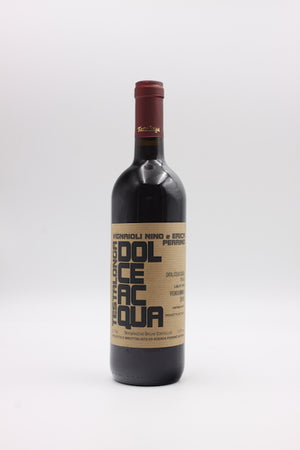- Home
- The Wines from Testalonga
- Testalonga: Vermentino 2022


Testalonga: Vermentino 2022
- €38,90
Antonio Perrino is a garage winemaker.
He was one even before the term was coined in Bordeaux, stripped of its true meaning, and turned into a marketing concept and communication strategy, which was then relentlessly implemented in Bordeaux.
These ideas and strategies passed Antonio by like the overly concentrated, dark Merlots that, from the 1980s onward, became the contribution of Bordeaux garage winemakers to the history of wine culture, eventually conquering the world, with supporters even around his homeland in Dolceacqua, Liguria. Antonio, however, continued to focus on his monastic, pale Rossese, one of the most refined, delicate, and sophisticated red wines in Italy. And on his Vermentino, which, just like his red counterpart, consistently refused to follow overregional trends.
Style
Antonio macerates the Vermentino for five days. But – and here we quote the words of others, which couldn’t be more accurate – “the maceration is not intended to give the wine tannin and a heavy chassis, but rather serves to emphasize its flavor nuances” (Castagno & Co.: Vini da Scoprire). The little tannin in the wine is so smooth and fine that it’s barely noticeable – the structure is primarily given by a mix of mineral substance and acidity, which gives the wine pressure and drive, carrying it towards the palate. There and a little further down, they remain for the next few minutes.
The wine is aged for 18 months in not-too-large oak barrels, where Antonio, unlike his French colleagues, exclusively uses 100% used oak.
Data Sheet
Grape Variety: 100% Vermentino
Vineyard: Steep single vineyard above Dolceacqua, with a view of the sea, and thus influenced by it. Sandy, weathered soils. Old vines (50+ years old)
Harvest: By hand in 25 kg baskets
Fermentation: Spontaneous | wild yeasts, no temperature control
Aging: 18 months in used oak barrels, five-day maceration
Filtration: None
SO₂: <50mg/l
Alcohol Content: 13.5% vol.
Closure: Natural cork
Drinking Temperature: 10-12°C
Optimal Drinking Window: From now – 2030
Volume and Price per Liter: 0.75 l (€48.92/l)
Philosophy: All winemakers listed at Vinonudo use compost, organic fertilizers, and natural preparations in their vineyards, avoiding herbicides, pesticides, and synthetic fertilizers.
Newsletter
Who knows more, tastes more. Once a week there is news about our wines, winegrowers and events.
© 2025 vinonudo | Shopify Theme by Mile High Themes | Powered by Shopify
